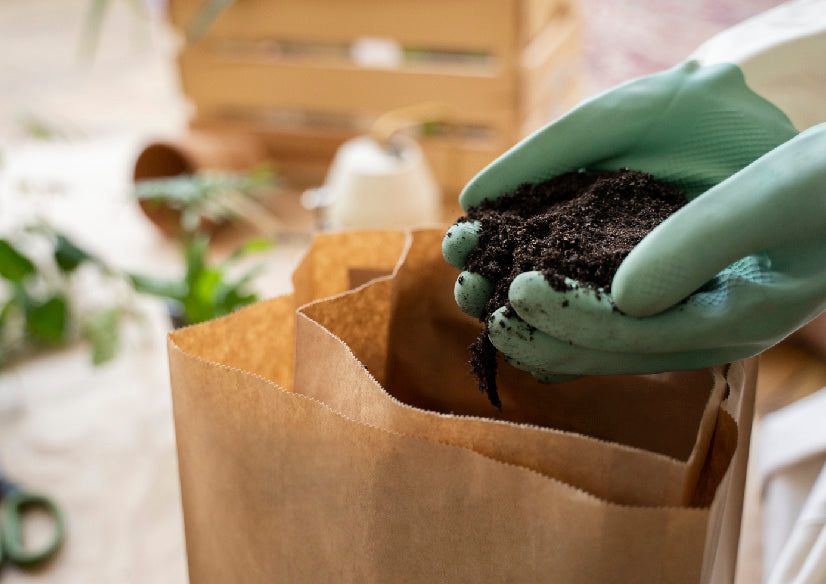Composting and Climate Change: Reducing Methane Emissions

Composting and Climate Change:
Reducing Methane Emissions
Climate change is no longer a distant threat; it's a pressing reality we face collectively. The planet's average temperature is rising at an alarming rate, primarily due to greenhouse gas emissions like methane. While carbon dioxide often takes center stage in climate discussions, methane is a potent greenhouse gas with 26 times the warming power of CO2 over a 100-year period.
Addressing methane emissions, therefore, is crucial in mitigating climate change and its devastating consequences.
One often-overlooked solution lies in our everyday practices: composting.
This simple yet powerful process offers a natural and sustainable way to reduce methane emissions and contribute to a healthier planet. This blog delves into the connection between composting and climate change, empowering individuals and communities to take action through this readily available solution.
Understanding Methane Emissions
Methane, a colorless and odorless gas, is the second-largest contributor to human-caused climate change. While naturally occurring, its presence in the atmosphere has significantly increased due to human activities. One major source of methane emissions is the decomposition of organic waste in landfills.
Landfills operate under anaerobic conditions, meaning they lack sufficient oxygen. This environment fosters the growth of methanogenic microbes, which break down organic matter and release methane as a byproduct. These emissions contribute significantly to global warming, accelerating the rate of climate change.
Beyond its environmental impact, landfills pose various environmental and health concerns. They produce leachate, a toxic liquid that can contaminate soil and groundwater. Additionally, they contribute to air pollution by releasing harmful gases and volatile organic compounds.
Composting: A Sustainable Solution
Composting offers a sustainable alternative to landfill disposal of organic waste. It's a natural process that transforms food scraps, yard trimmings, and other organic materials into nutrient-rich soil amendments.
This not only reduces waste sent to landfills but also creates a valuable resource for gardens, farms, and landscapes.
There are various composting methods to suit different needs and preferences.
Backyard composting, using bins or piles, allows individuals to manage their organic waste conveniently at home. Community composting programs provide larger-scale solutions, encouraging collective participation and offering convenient drop-off locations.
Vermicomposting, utilizing worms to break down organic matter, is another effective method gaining popularity.
Composting is not only beneficial for the environment but also remarkably accessible. Individuals can start composting with minimal resources and space, making it a viable solution for everyone.
The Science Behind Composting and Methane Reduction
The magic of composting lies in the power of microorganisms. During the composting process, various bacteria, fungi, and other microorganisms break down organic matter under aerobic conditions, meaning with ample oxygen. This facilitates a different decomposition pathway compared to landfills.
In the presence of oxygen, microorganisms primarily convert organic matter into carbon dioxide and water vapor.
While carbon dioxide is also a greenhouse gas, it has a significantly lower warming potential than methane. Additionally, some of the carbon from the organic matter gets sequestered in the compost, further reducing its overall impact on the climate.
Extensive research confirms the effectiveness of composting in reducing methane emissions.
Studies have shown that diverting organic waste from landfills to composting can significantly decrease methane generation, contributing positively to climate change mitigation efforts.
Individual and Community Action
The power to combat climate change lies not just in large-scale solutions but also in individual actions. By embracing composting at home, individuals can directly contribute to reducing methane emissions and create a positive environmental impact.
Starting a compost bin or pile is surprisingly simple.
Choosing suitable materials like food scraps, yard trimmings, and cardboard is crucial. Maintaining proper moisture and aeration levels ensures efficient decomposition. Numerous resources and online tutorials provide detailed guidance on setting up and maintaining a successful compost system.
Community composting programs offer another avenue for individuals to participate in reducing methane emissions. These programs often provide convenient drop-off locations for residents to contribute their organic waste, which is then collectively composted in larger facilities. Participating in such programs not only reduces individual waste but also fosters a sense of community and collective action towards environmental sustainability.
Beyond composting, individuals can further contribute by minimizing food waste and practicing responsible consumption habits. Planning meals, buying only what's needed, and utilizing leftovers are simple yet impactful ways to reduce the amount of organic waste generated in the first place
The Broader Impact of Composting
The benefits of composting extend far beyond methane reduction. Composted material, rich in nutrients and organic matter, acts as a valuable soil amendment. It improves soil structure, aeration, and water retention, leading to healthier and more productive plants.
This reduces reliance on chemical fertilizers, further contributing to sustainable agricultural practices.
Composting also holds economic potential. As the demand for compost grows, it creates opportunities for new jobs in the waste management sector. Additionally, reducing reliance on landfills translates to cost savings for municipalities and individuals.
Conclusion
Composting may seem like a small, individual action, but its collective impact on mitigating climate change is significant. By diverting organic waste from landfills and promoting aerobic decomposition, composting significantly reduces potent methane emissions, contributing to a healthier planet for ourselves and future generations.
Embracing composting is not just about environmental responsibility; it's about embracing a sustainable lifestyle and fostering a sense of community around a shared goal. Every individual who starts composting participates in community programs, or simply reduces food waste, is taking a step towards a more sustainable future.
Remember, even small changes, when multiplied by millions, can create a powerful ripple effect.
Let's harness the power of composting and collectively work towards a future where our everyday actions leave a positive mark on the environment.


















Leave a comment
This site is protected by hCaptcha and the hCaptcha Privacy Policy and Terms of Service apply.